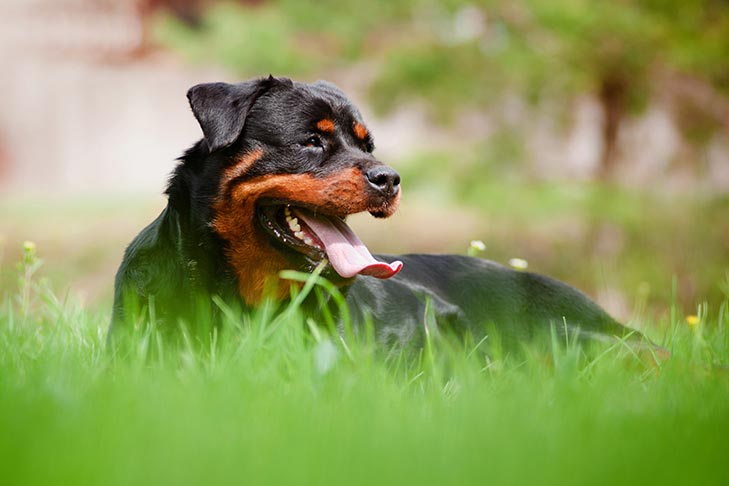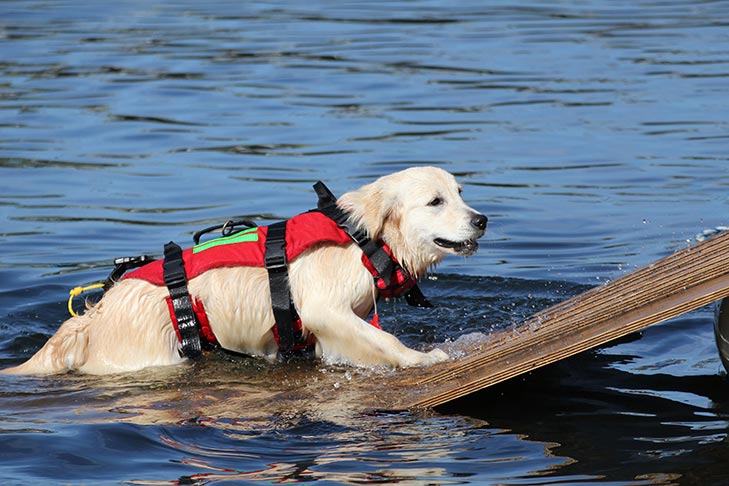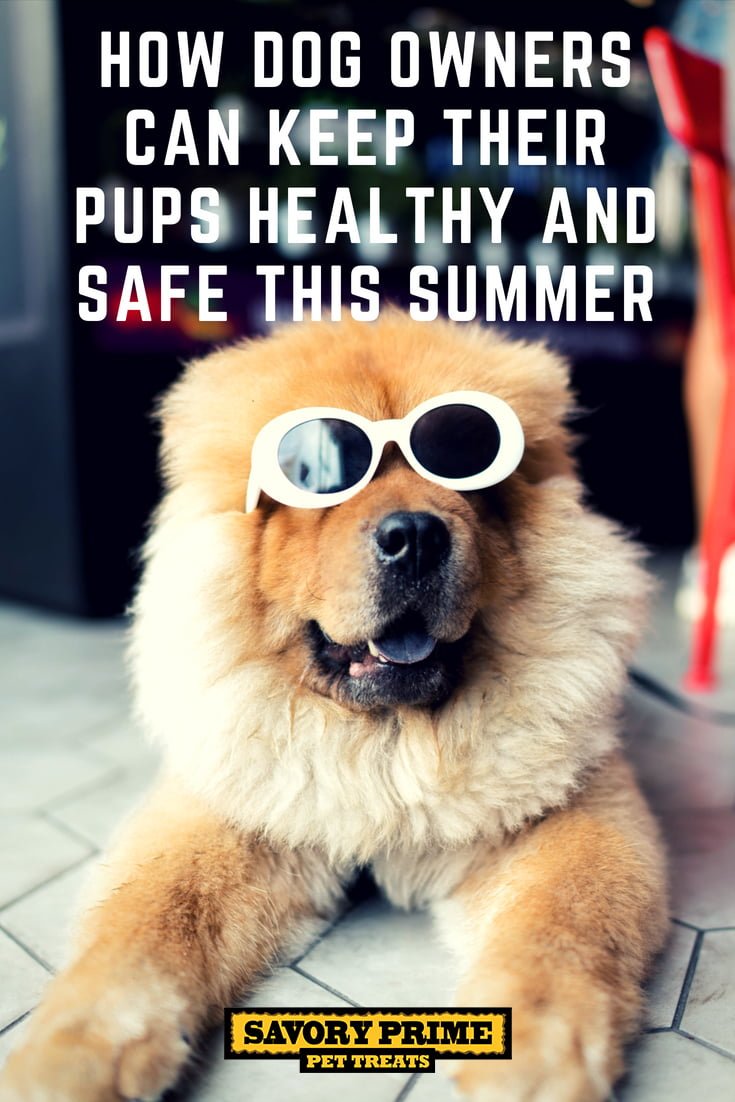Now that warmer weather is here, it’s extremely important for dog owners to take certain precautions when it comes to their pup’s health. To ensure that you and your canine companion have an enjoyable summer, we’ve compiled a list of things to keep in mind this season, so that your furry BFF stays safe.
Overheating
Every year, dogs die from being left alone in hot vehicles. A car’s temperature increases about one degree a minute and can reach life-threatening highs quickly, even with the windows open. Bottom line is, you should NEVER leave a dog alone in the car.
Heatstroke
While a dog’s fur might offer protection in colder months, it can be dangerous in warmer weather. Dogs with longer, thicker, and darker fur are at a greater risk for heatstroke because their coat soaks up heat from the sun.
“A dog’s fur is equivalent to a coat,” says Sadie Cornelius from “Canine Journal.” “Imagine wearing a coat when it’s 100 degrees outside.” Brachycephalic breeds, such as Pugs and Bulldogs, are also at a greater risk because of certain restrictions to their airways.
Humidity can increase the risk for heatstroke; when it’s humid outside, a dog’s temperature rises. “A dog cools off by panting, which causes evaporation of saliva,” says Dr. Ann Hohenhaus, a staff doctor at New York City’s Animal Medical Center. “If the environmental air is full of water, saliva can’t evaporate and cool dogs when they’re panting.”
Familiarize yourself with the signs of heatstroke, and call your veterinarian immediately if you notice any of these symptoms.
Sunburn
Dogs can get sunburned, too. Canines that are hairless, white or a light color are more sensitive to sun exposure and at risk for sunburn and sun-induced tumors. Talk to your veterinarian about the best ways to avoid this, and consider using a sunscreen made specifically for your dog.
Hot Surfaces
If the pavement feels hot when you touch it with your hand, imagine what it feels like on your dog’s paws. If you can’t walk on the ground barefooted, neither should he. It takes time to acclimate a dog’s pads to certain ground surfaces, especially when those surfaces are warm or hot. Blisters and cuts are commonly seen on dogs whose owners did not consider or pay attention to the bottom of their feet.
Flea and Tick Care
Your dog should be on a flea-and-tick preventive to reduce the risk that he’ll contract tick-borne infections such as Lyme disease. Along with oral pills and flea-and-tick collars, there are pet-friendly sprays for additional protection. Hot, humid weather can cause a hot spot on a dog that is scratching, i.e. a large, painful area of inflammation that can be difficult to manage, so make sure your pup’s skin is protected before temperatures get too high.
Hi-Rise Syndrome
With warmer weather comes the desire to open windows and balcony doors. Doing so can lead to your dog falling, slipping, or jumping out the window in what Dr. Hohenhaus refers to as “high-rise syndrome.” Make sure your pet doesn’t have access to any open windows or doors. Summer deck parties can also prove hazardous, so it’s important that someone is always monitoring your dog.
BBQ
With their keen sense of smell, dogs find the scents at a barbecue very enticing, but the food served can be dangerous to their health. Think twice before giving your dog a cooked bone, because they can splinter when chewed, causing serious injury to your dog.
Denise Fleck, an author and animal care instructor, advises against sharing food with your dog. “Dogs don’t metabolize food like we do and can end up with severe inflammation,” she says.
Foods like corn on the cob and any sort of fruit pit can be extremely problematic if swallowed. They can get stuck in the intestine and, according to Dr. Hohenhaus, are not easily detected on an X-ray.
Plants
We all want to make our outdoor areas look nice, but certain plants and lawn care products can be toxic to dogs. Avoid the potential risk of your canine companion eating something he shouldn’t by planting a dog-friendly garden.
Swimming
Contrary to popular belief, not all dogs can swim. If you plan on taking your dog in the pool, make sure he knows how to swim and how to get out. Pools that do not have some form of stairs are the most dangerous for dogs. If you do have a pool, it should be fenced to protect your pup from wandering in. He should never be allowed in the pool unsupervised. It’s a good idea to have a dog life jacket on hand, especially if you frequent the beach or like to go boating.
Fourth of July
While you may enjoy the fun and festivities that come with Fourth of July celebrations, your dog might feel the opposite. The loud noises and sudden flashes of fireworks are frightening and can disorient or startle a dog. According to a 2015 report from the American Society for the Prevention of Cruelty to Animals (ASPCA), nearly one-in-five lost pets first go missing after being scared by the sound of fireworks, thunderstorms, or other loud noises. Dr. Hohenhaus recommends taking precautions ahead of time to ensure your dog’s safety
Recent Pet Posts
Blog Categories
Product categories
- Accessories (7)
- Chicken & Veggie Wraps (8)
- Grillers Jerky Tenders (4)
- Jerky Treats (10)
- Made in the USA (9)
- Non-Rawhide Treats (28)
- Beggar Bone (11)
- Bully Sticks (4)
- Butcher Bone (4)
- Cod Skin Fish Treats (3)
- Pork Skin Twists (2)
- Pressed Rawhide Bones & Rolls (16)
- Bones & Rolls (6)
- Pressed Rawhide Bulk (6)
- Twist Sticks (4)
- Savory Munchies (13)
- Supreme Bones & Rolls (48)
- American Rawhide Bulk (16)
- Rawhide Bones (14)
- Rawhide Chips (6)
- Rawhide Rolls & Sticks (12)
- Uncategorized (8)




